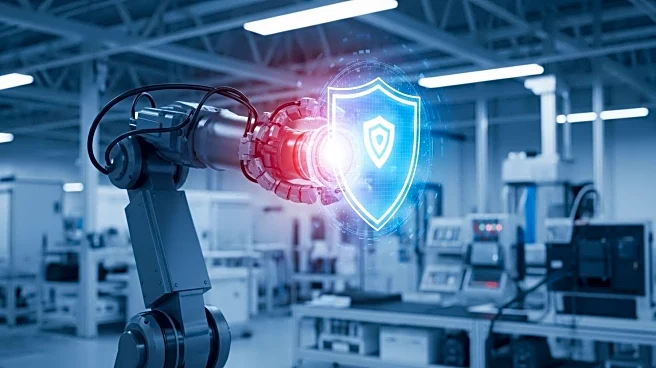What's Happening?
A recent report by LevelBlue highlights the growing threat of AI-driven cyberattacks in the manufacturing sector. The report, based on a survey of 220 manufacturing leaders, predicts an increase in sophisticated cyber threats, including AI-enhanced attacks, deepfake, and synthetic identity threats. Despite the anticipated rise in these threats, only a minority of executives feel adequately prepared to counteract them. Distributed denial of service (DDoS) attacks, exacerbated by geopolitical tensions and vulnerable IoT devices, continue to be a significant concern. The report also notes that visibility into software supply chains is low, with only a small percentage of firms actively engaging with vendors on security verification, increasing the risk of supply chain breaches.
Why It's Important?
The findings underscore a critical need for the manufacturing industry to enhance its cyber resilience strategies. As AI-driven cyber threats become more prevalent, the potential for significant disruptions in manufacturing operations increases. This could lead to substantial economic losses and impact the industry's ability to innovate and compete globally. The lack of preparedness among executives highlights a gap that could be exploited by cybercriminals, potentially affecting data privacy and the integrity of manufacturing processes. Strengthening cyber resilience is essential to safeguard against these threats and ensure the continuity and security of manufacturing operations.
What's Next?
Manufacturing leaders are encouraged to integrate cyber resilience into their business strategies, aligning security considerations with top-down business decisions. This proactive approach involves strengthening software supply chain resilience and engaging more actively with vendors on security verification. As the industry faces increasing cyber threats, it is crucial for companies to prioritize cybersecurity measures and invest in technologies that can detect and mitigate these risks effectively. The ongoing focus on cyber resilience will be vital in protecting manufacturing ecosystems from potential breaches and ensuring long-term operational stability.
Beyond the Headlines
The report's findings may prompt broader discussions on the ethical implications of AI in cybersecurity, particularly concerning privacy and identity protection. As AI technologies evolve, they could be used to create more sophisticated cyber threats, challenging existing security frameworks. This development calls for a reevaluation of current cybersecurity policies and practices, potentially leading to new regulations and standards in the industry. The emphasis on cyber resilience also highlights the need for continuous education and training for employees to recognize and respond to emerging threats effectively.









